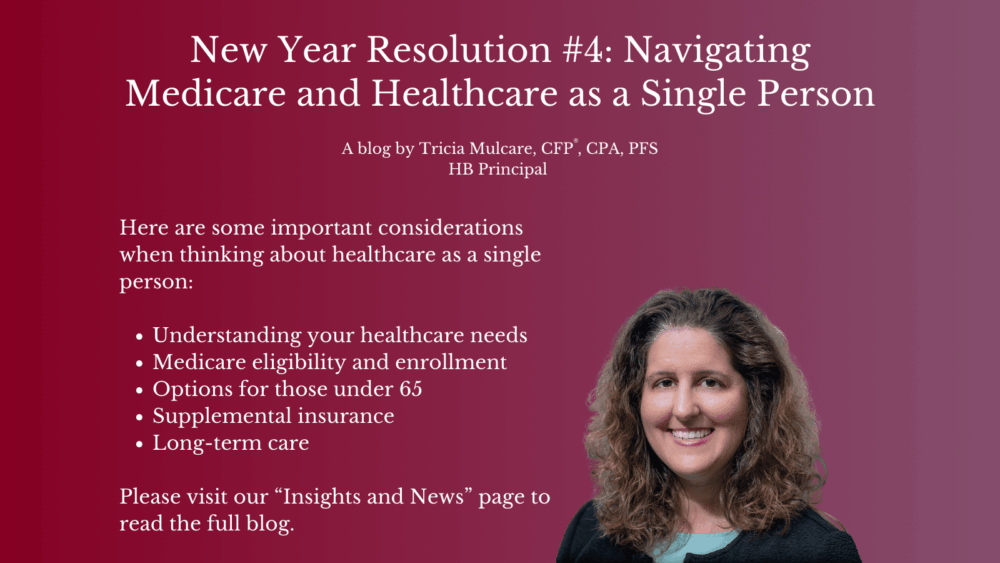While many types of insurance coverage are important, perhaps the one at the top of most people’s minds is healthcare. Oftentimes, employers provide coverage options, but the “game” becomes more challenging when our circumstances change dramatically and rather suddenly. Many of my healthy, married couples approaching age 65 find the Medicare options vast and cumbersome to understand. When you find yourself suddenly single, there are a cascade of decisions and adjustments, including potentially re-evaluating your healthcare coverage, that need to be addressed.
Whether you are divorcing or have lost a spouse, navigating Medicare or private healthcare plans as an individual can feel overwhelming. However, with the right information and planning, you can secure coverage that both meets your needs and fits your budget. Here’s a guide to help you along the way.
Understanding Your Healthcare Needs
Your healthcare plan should align with your current medical needs and anticipated future care. Start by asking:
- What are my regular medical expenses (e.g., medications, specialist visits)?
- Do I have any chronic conditions requiring ongoing treatment?
- What is my budget for premiums, deductibles, and out-of-pocket expenses?
Medicare: Eligibility and Enrollment
If you are 65 or older, Medicare may be your primary option. Here’s a breakdown of the various parts:
- Part A (Hospital Insurance): Covers inpatient care, skilled nursing facilities, and hospice. Most people don’t pay a premium if they or their spouse paid Medicare taxes for a sufficient period.
- Part B (Medical Insurance): Covers outpatient care, preventive services, and durable medical equipment. This requires a monthly premium.
- Part C (Medicare Advantage): Offers bundled plans from private insurers, often including vision, dental, and prescription drug coverage.
- Part D (Prescription Drug Coverage): Helps cover the cost of medications. Plans vary in coverage and cost, so compare options carefully.
If you recently divorced, confirm if your former spouse’s Social Security work record qualifies you for premium-free Part A. Be mindful of enrollment periods to avoid late penalties.
Options for Those Under 65
For individuals under 65, options include:
- COBRA Continuation Coverage: Allows you to stay on your former spouse’s employer-sponsored health plan for up to 36 months. While this offers continuity, it can be expensive since you will pay the full premium plus a 2% administrative fee.
- Health Insurance Marketplace Plans: These are available through the Affordable Care Act (ACA). Depending on your income, you may qualify for subsidies to reduce premiums.
- Medicaid: If your income has significantly decreased, you might be eligible for this government-funded program.
Supplemental Insurance and Long-Term Care
- Medigap Plans: For those with Medicare, supplemental insurance can cover out-of-pocket expenses, including copayments and deductibles.
- Long-Term Care Insurance: If you’re concerned about future nursing home or assisted living costs, explore long-term care policies that can be combined with life insurance coverage.
Steps to Take Now
- Review Your Current Coverage: If you are covered through a former spouse, confirm how long the coverage will continue and start exploring alternatives.
- Budget for Healthcare Costs: Create a line item in your financial plan for healthcare premiums, deductibles, and prescriptions.
- Seek Professional Guidance: A fee-only financial advisor with specialized knowledge of healthcare options can help you evaluate plans and costs tailored to your needs and make introductions to professionals who can help you secure the appropriate coverage.
Empower Yourself Through Knowledge
Taking control of your healthcare options as a single person is an opportunity to make choices that support your well-being and financial security. Whether it’s selecting a Medicare plan, understanding COBRA, or evaluating private insurance, you should approach each decision as an investment in your future. Remember, you are not alone. Utilize resources like Medicare.gov, state insurance marketplaces, and professional advisors to guide you through this transition confidently.
To learn more or get help with your finances, please visit us at homrichberg.com, send an email to info@homrichberg.com, or call 404.264.1400.
Important Disclosures
This article may not be copied, reproduced, or distributed without Homrich Berg’s prior written consent.
All information is as of the date above unless otherwise disclosed. The information is provided for informational purposes only and should not be considered a recommendation to purchase or sell any financial instrument, product, or service sponsored by Homrich Berg or its affiliates or agents. The information does not represent legal, tax, accounting, or investment advice; recipients should consult their respective advisors regarding such matters. This material may not be suitable for all investors. Neither Homrich Berg nor any affiliates make any representation or warranty as to the accuracy or merit of this analysis for individual use. Information contained herein has been obtained from sources believed to be reliable but are not guaranteed. Investors are advised to consult with their investment professional about their specific financial needs and goals before making any investment decision.
©2025 Homrich Berg.


